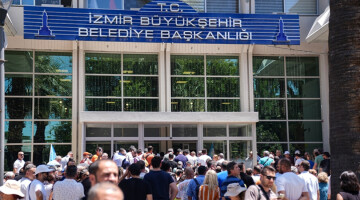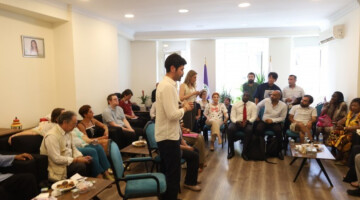Tayyip Erdogan announced glad tidings on February 8 in his "speech to the nation" on Wednesday. Then on Wednesday, the military operation began in the guerrilla area of Gare in Southern Kurdistan (Northern Iraq)”. The HPG said Feb. 11 that the Turkish Air Force bombed a POW camp. The Turkish Defense Ministry said Feb. 12 that the operation was proceeding as planned. On Saturday evening, Defense Minister Hulusi Akar announced that the bodies of "13 of our citizens" had been found. He did not comment on the function of the killed MIT members, military personnel, and police officers who were held as prisoners of war by the PKK. Rather, he took pains to conceal the fact that Gare had been bombed by forty fighter jets. To bolster the disinformation campaign on the Gare invasion, Akar shared that "one of our citizens was martyred by being shot in the shoulder and the other twelve were martyred by being shot in the head."
"A state that massacres its own soldiers is capable of anything"
Yannis Vasilis Yaylalı is a Pontus Greek from Samsun province on the Black Sea. He was wounded as a soldier of the Turkish army in 1994 and captured by the PKK. During the two years and three months of captivity, he became a peace activist. After his release, he was arrested by the Turkish state and spent three and a half months in prison. Together with peace activist Meral Geylani, he had moved to the village after the airstrike on Roboski on December 28, 2011, to support the bereaved families of the 34 people killed.
Speaking to ANF, Yaylalı commented on the Turkish army's targeted attack on the prisoners in Gare. He first emphasized that he deeply regrets the deaths of the prisoners, saying, "The government wants to slow down its loss of votes with such massacres. I know how cruel it is anyway. If the PKK can ensure ways for this massacre to be solved, it can be made available to the public at home and abroad. A state that massacres its own soldiers is capable of anything."
The PKK should make an urgent appeal to the international public, says Yaylalı and continues: "If this massacre can be solved, those responsible can be brought before an international criminal court. The parents of the captured soldiers were in a miserable situation even before, meanwhile words have no meaning for them, but they must never trust the state and must fight for justice for their children. The murderers of their children, partners or fathers cannot give them a martyr medal. They believed in the state and the state not only bombed their relatives but also executed them with shots to the head. Now it is trying to improve its reputation on the basis of the corpses. The families must not allow this to happen. What would happen to their relatives was clear from the beginning of the operation anyway, but they must now take action against this manipulation and fight for these cruel murderers to be tried and sentenced."
Yaylalı appeals to non-governmental organizations to stand by the families: "A struggle for justice must be given together with the relatives against this crime which was deliberately committed by the state.”
The former prisoner of war and current peace activist draws a comparison to the Roboski massacre: "Just like back then in Roboski, the state will pull out all the stops to cover up the massacre. During the AKP's time in power, this kind of extrajudicial execution has virtually become the norm. If this is allowed to happen, there will never be an end to such massacres. We have always said that if this series of massacres is broken in Roboski, this war government will be razed to the ground and the possibility of facing it will arise. Unfortunately, also due to our lack of experience, we have had to watch the state cover up massacres despite our years of struggle. Now, based on our experiences from the past, it is a matter of preventing this massacre from being covered up like Roboski. We have to fight for this brutal war government to be confronted with its deeds."














